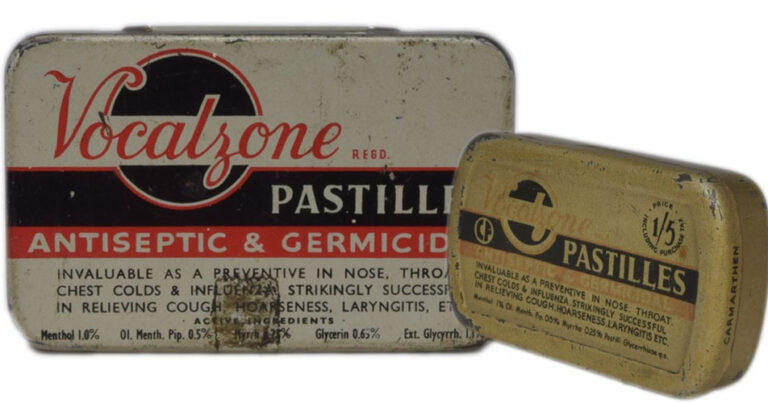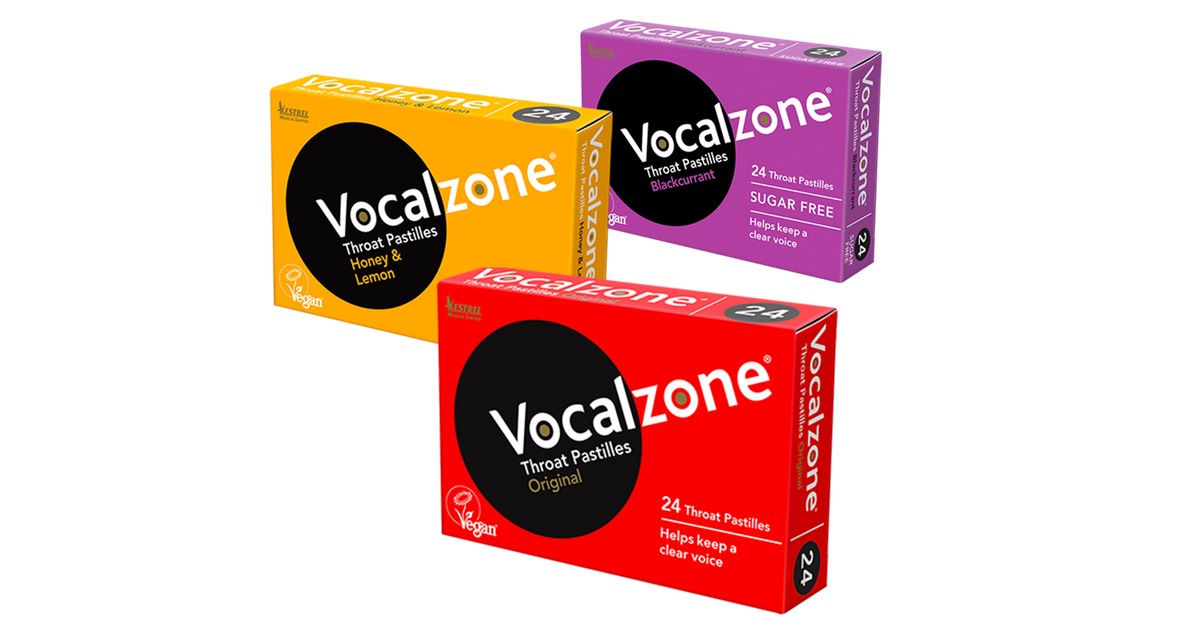Some vocal coaches and voice scientists claim Vocalzone pastilles do more harm than good. But is there actually any science to back this view up? Alexa Terry, aided by Line Hilton, went looking for answers. Here’s what they found.
When “Vocalzone” is uttered in the vocal pedagogy world you can almost hear the angry hiss of worms as the can is prised open. It’s amazing how these little pastilles have the power to provoke such heated debate: some vocal pedagogues consider them dangerous to the health of the voice, while others regard them highly, happy to recommend them as part of a singer’s vocal health care regime.
So why such a “Marmite” divide? First, let’s fire up our time machine and programme our destination: 1907.
History
It was in the early 20th Century when the liquid form of the Vocalzone recipe was first concocted by a Welsh-born doctor, William Lloyd. An ENT house surgeon at the London Hospital, Lloyd had been assigned the task of developing a medicinal mixture to aid a famous heavy-smoking Italian tenor. This tenor had been experiencing vocal issues while performing at London’s Covent Garden. You may have heard of him, he was none other than Enrico Caruso, the first artist ever to sell one million records with the song Vesti la Giubba.
The two men soon developed a strong friendship – so much so that Lloyd travelled with Caruso as his personal doctor on international tours. Meanwhile, Lloyd’s brother, Walter, began manufacturing the Vocalzone product from his pharmacy in Carmarthen, and 1912 saw the launch of the Vocalzone pastille. By 1930, these pastilles could be found lining the shelves of most UK chemists.
Some 107-years later, Vocalzone is still a family run business, and counts Sir Tom Jones, Katherine Jenkins, Michael Ball and Stereophonics’ front man Kelly Jones among its many long-term customers.
I was interested in exploring the validity of the belief that Vocalzone products should be avoided, and the claims that they numb the throat, contribute to mucosal irritation, or are simply a placebo. I decided to elicit the help of BAST Trainer and Performing Arts Medicine Specialist, Line Hilton. She originally trained as a nurse before taking up a singing career and has access to medical research databases and the Royal Society of Medicine library. Together we dived right into the can of hissing worms.
Disclaimers
There are a few things we need to get clear before we go any further.
- I am not a doctor or a scientist – no matter how many episodes of The Big Bang Theory or 24-hours in A&E I watch. I am just presenting you with the information we have gathered through literature research, discussion and interviews.
- Back in 2015 Line contributed to a series of vocal health videos that was sponsored by Vocalzone, as mentioned later in this piece.
- In no way has Vocalzone (or any other organisation for that matter) provided any financial or material incentive towards the research and writing of this article. It was driven purely by curiosity.
Deep dive
The “offending” culprits appear to be Vocalzone’s three main ingredients: menthol, peppermint oil and myrrh tincture. We are going to take a closer look at each ingredient and share what we’ve found out about them.
Menthol (1.07%)
The main focus of disdain in the Vocalzone argument is menthol. Menthol can be found in many household items, including toothpaste, topical ointments, mouthwash and chewing gum. It acts as a suppressant, antiseptic, decongestant, and a pain killer, helping to relieve blockages and soothe sore throats. It is unsurprising that it’s a common ingredient in many cold and flu remedies. Menthol is the “Elsa” of the organic compound world with its cooling nature, triggering the body’s cold-sensitive receptors; massage Tiger Balm into your temples and it will soon make your head feel as if it’s stuck inside an ice lolly.
It is commonly believed that menthol is drying. This “fact” has been touted by singing teachers, speech therapists and laryngologist for decades. Surprisingly, we were unable to find any information or research that supported this belief. It is not listed as a side effect in any of the pharmaceutical references we viewed. Nor were we able to find any medical or pharmaceutical references explaining the impact of menthol on mucosal membrane or body cells that we could apply to the voice. We did, however, discover that menthol is a calmative. That is, it can relieve flatulence!
Many of the studies we found on menthol related to cigarettes. Menthol is used as a flavouring in some cigarettes and the research indicates that this makes smoking more appealing and pleasant tasting. The EU placed a ban on selling menthol-flavoured cigarettes from May 20 this year to curb cigarette addiction. There were also studies relating to the analgesic impact of menthol. One interesting read was a study looking at the potential of warm menthol compresses as an effective treatment for dry eye, a condition of the eyes where there isn’t enough lubrication due to low tear production.
Naturally, if you have a sensitivity to menthol or take too much you might experience adverse effects such as nausea, abdominal pain, vomiting, vertigo and drowsiness. Giving menthol to infants is potentially dangerous – so avoid. Vocalzone clearly state that their pastilles are unsuitable for children under the age of 12 years and pregnant women.
So how much is too much? There is one case study of an 86-year-old man being admitted to hospital unresponsive, with skin lesions and gastric upset. After gaining consciousness he was disoriented and unsteady on his feet. Through elimination the doctors eventually decided the cause was ingesting two bags of menthol-rich cough drops every day for 20 years. Six months after he stopped, the symptoms disappeared.
I called two pharmacists who were unable to provide a conclusive answer to my questions on the effects of menthol on the voice. I asked a biochemist what percentages he considered would be needed to cause tissue damage and if he had any opinions regarding the particular blend of ingredients in Vocalzone. He said there wasn’t an easy answer. The general consensus seems to be that the impact of menthol is dependent on dosage, application, the absorption mechanism and the ingredient concentration. With the percentage of menthol measuring 1.07% in a single pastille it could be argued that such a low dosage would be too weak to have profound negative effects. Unfortunately, an extensive search through the Royal Society of Medicine medical database was unable to come up with research to confirm or refute this.
Vocalzone say: “The concentration of menthol used in our throat pastilles is of a safe level and the benefits of using menthol for throat care can be found in Martindale: The Complete Drug Reference.”
Peppermint oil (0.54%)
Peppermint oil is often used to help relieve the discomfort of irritable bowel syndrome and headaches, and is said to be a pain killer, a muscle relaxant and soother.
In the Journal of Singing’s 2016 Winter Volume, an article authored by Kirsten Meenan, Michelle White, Jonathan Romak and Robert T. Sataloff (Common Vocal Remedies: What Are They and Do They Really Work? Part 2) states: “Use of peppermint oil should be avoided in children due to potential for asthma-like attacks and possible respiratory failure.” However, the article does also state that the percentage of peppermint oil included in Vocalzone pastilles is likely too small to cause such issues.
Myrrh tincture (1.18%)
Myrrh is said to be effective in treating inflammation and regulating mucous levels.
In an interview with Chris Johnson and Steve Giles via their Naked Vocalist podcast, Vocalzone say: “The myrrh tincture stimulates blood flow in the tissues, which stimulates the production of mucous… I can say that in 100-years of Vocalzone being on the market, we’ve never had a report of vocal problems caused by the menthol content.” You can find the podcast interview here.
Alvin Mennie (Vocalzone’s Brand and Communications Manager) says: “Everything was formulated around the intended use for vocal health care. The ingredients are included for their own individual properties and benefits and, if you look at the core formulation, there is a balance. I think it’s all about exercising caution and knowing when and how you’re using the ingredients, and how they affect what you are trying to do afterwards.”
The core ingredients of the Vocalzone pastilles have remained the same since its first creation. Alvin says: “Naturally, as manufacturing processes and technology have evolved, certain ingredients have been replaced. For example, there would never have been a natural colouring for Vocalzone pastilles that was black back in 1912, so it was an artificial colour that would have been replaced with a vegetable carbon. There have been some recent substitutes to make the product suitable for vegans and vegetarians – for example, the beeswax has been replaced with carnauba wax.
“We also introduced new flavours which are slightly different. They still have the same core formulation, however there is no liquorice in the blackcurrant flavour and we have included an artificial sweetener so it’s also sugar-free.”
Do they contain an anaesthetic?
Vocalzone does not and has never included anaesthetic in its recipe, unlike some throat sprays and lozenges which include ingredients like benzocaine. Menthol, however, is said to have anaesthetic (painkilling) properties which, one might argue, could mask pain if consumed in higher dosages, or if it were to be applied directly to a particular area at a strong concentration.
Accommodating an unwanted viral guest in my throat last Winter, I decided to try out Difflam Sore Throat Rinse which is a benzydamine hydrochloride solution with local anaesthetic properties and, immediately after the gargle, the back of my mouth and throat felt numb. It did relieve the pain, but I also forgot that I had a tongue. These are sensations that I, personally, have not experienced with the Vocalzone pastilles.
“It’s counterproductive to what we’re trying to do,” Alvin says. “(Anaesthetic) numbs everything and doesn’t distinguish between vocal damage and vocal strain. I think, sometimes, people confuse the effects of an anaesthetic-based lozenge with the cooling properties of a Vocalzone. Although they might relieve discomfort from vocal strain, Vocalzone pastilles won’t mask vocal damage.”
Like anything there is a risk of side effects, and everyone reacts differently. Like Alvin says: “If you’re not sure, always consult a doctor. People do have individual needs.” Still, if Vocalzone pastilles are to be avoided because they include even the smallest amount of what some call “counterproductive” ingredients (despite their proven helpful properties), could it then be argued that, as voice users, we should never drink a drop of alcohol or caffeine because they’re dehydrating, or never step outside in the Summer in case we suffer a bout of hayfever which can lead to post nasal drip and, consequently, laryngitis?
If so, does that also mean that we shouldn’t crank up the radiators in the Winter months because central heating is drying for the voice? With a lot of things in life, we are encouraged to proceed with caution and in moderation; heck, take too many paracetamol and they mutate from being a handy pain reliever to the Grim Reaper. Therefore, shouldn’t we be able to consider Vocalzone in the same balanced manner?
Manufacturing and licensing
Some have shared their concern that Vocalzone no longer holds a medical licence (dropped in December 2017 by Vocalzone themselves), and that no formal product testing has been carried out before public release.
Alvin says: “Vocalzone was medically licensed from the mid-1960s up until 2017 and clinical trials were conducted in the 1940s in cases of strep throat; we had pharmacovigilance and a global reporting system so we would know if there were any issues with the product. The medical licence was dropped because the formulation couldn’t change and we had an increasing global demand. The MHRA (UK Medical and Healthcare Regulatory Agency) have a very different process to the FDA (U.S Food and Drugs Administration). In fact, the FDA have some ingredients that they do not accept in their pharmaceutical products that the MHRA do.
“The MHRA have one of the most stringent regulatory processes going. It’s one of the main reasons why the pharmaceutical industry, on the whole, is struggling to keep up with digital transformation. In terms of our regulation, we had to report any adverse events to the MHRA and we had to follow them up within 24-hours. The benefit of having a medically licensed product is that we have full visibility of any issues or adverse events that have happened – and we haven’t had any issues on our pharmacovigilance.”
Over the years Vocalzone have received a small number of complaints about side effects, which when investigated were linked to user misuse.
“Now that it’s off licence, we have been able to create new flavours and expand on the Vocalzone range. Compared to a lot of the other products on the market, we have a far more stringent process. There are no clinical studies that we’re aware of or that were commissioned by the NHS but, now that we’re a food product, it’s not required. We’ve built up a reputation on being a solid product and that has been enough for us.
“We do extensive research on everything that we do. It’s both primary and secondary; we would use secondary research to get a full and accurate understanding of the ingredients, and we have experts on board. For example, with our tea range, we worked with experts in the field of herbal teas to help us put the right ingredients in at the right levels to offer a benefit and not be too overpowering. After that, we will get the product manufactured and then do testing. We have about 300 musicians at different levels who we will send samples out to and gather feedback from.
“The tea doesn’t get regulated like the pastilles but as a business we have taken the standpoint that we still monitor everything in pharmacovigilance.”
Vocal health and user guidance
Vocalzone strongly support singers’ vocal health, often exhibiting their products at events and publishing an online blog for voice users to reference in their professional or amateur work. “In terms of performance we have no-one professional (at Vocalzone),” Alvin says. “But I came from an acting background, our managing director is a choral singer and we have other instrumentalists – we have a passion for it. We’ve always been a business that has really tried to push the vocal care side of things, which is why we have set up relationships with the V-Team (Line Hilton, Chris Johnson, Joshua Alamu and Steve Giles) and others to educate how to actually look after your voice.”
In The Naked Vocalist podcast, Vocalzone say: “A lot of people use them if they’re doing a lot of rehearsing, if they are doing a lot of back-to-back gigs… say, five gigs in a week, then they become really useful then, so many people use them as a preventative… We [also] talk to ENT surgeons quite a lot within our company and some of the other work that we do.
“The general guidance is that you shouldn’t take more than one pastille every two hours,” Alvin says. “With Vocalzone, you can use them before, during and after singing. Sir Tom Jones always has a pastille in his mouth when he sings.”
Conclusion
Vocalzone pastilles are not a miracle cure but should be used in conjunction with the upkeep of good vocal health; a packet of pastilles is not going to clear up a cold, solve or even mask a vocal injury. However, if a teacher has had a jam-packed day of constant talking and demonstration, or if a performer has had a gruelling day of rehearsals – even if a singer finds themselves hoarse from illness – then Vocalzone pastilles may well come in handy to help reduce any inevitable fatigue on the voice in form of inflammation and puffiness, for example. Be that as it may, if a singer has vocal damage then no amount of Vocalzone pastilles will help or make it okay to continue singing.
“If a product didn’t work or it was counter-effective or counterproductive, it wouldn’t be on the market for 100-years,” Alvin says. “In a highly competitive market saturated with different products, they wouldn’t have stood the test of time if they were bad for you.”
References
Arita, R. et al. (2017) ‘Effects of a warm compress containing menthol on the tear film in healthy subjects and dry eye patients’. doi: 10.1038/srep45848.
Baibars, M., Eng, S., Shaheen, K., Alraiyes, A. and Alraies, M., 2012. Menthol Toxicity: An Unusual Cause of Coma. Case Reports in Medicine, 2012, pp.1-3.
Brayfield, A. (2017). Martindale. The Complete Drug Reference. 39th ed. (2017) London: Pharmaceutical Press, p.2598.
Johnson, D. et al. (2018) ‘Menthol Cough Drops: Cause for Concern?’, Journal of the American Board of Family Medicine : JABFM, 31(2), pp. 183–191. doi: 10.3122/jabfm.2018.02.170363.
Koteles, F. et al. (2018) ‘Inhaled peppermint, rosemary and eucalyptus essential oils do not change spirometry in healthy individuals’, Physiology & Behavior. doi: 10.1016/j.physbeh.2018.06.022.
Liu, B. et al. (2013) ‘TRPM8 is the principal mediator of menthol-induced analgesia of acute and inflammatory pain’, Pain, 154(10), pp. 2169–2177. doi: 10.1016/j.pain.2013.06.043.
Sataloff, R., 2017. Professional Voice. The Science And Art Of Clinical Care. 4th ed. San Diego: Plural Publishing, p.1123.
Wang Y et al. (2019) ‘Integrating tacrolimus into eutectic oil-based microemulsion for atopic dermatitis: simultaneously enhancing percutaneous delivery and treatment efficacy with relieving side effects’. Available at: http://search.ebscohost.com/login.aspx?direct=true&db=edsbas&AN=edsbas.151AB896&site=eds-live&scope=site (Accessed: 4 June 2020).
Aronson, J. and Meyler, L., 2016. Meyler’s Side Effects Of Drugs. 16th ed. Oxford: Elsevier, pp.831-832.
LEARN MORE
Listen to Dr Jenevora Williams explain how the vocal rehabilitation process works for singers. Tune into the Singing Teachers Talk podcast here.





